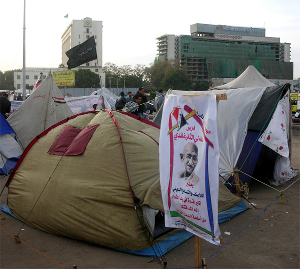Editorial
People Power: removing consent to governments whenever this is required

Tahrir Square. El Cairo. Photo: Maria Fanlo
This edition of Peace in Progress is devoted entirely to an issue associated with non-violence and civil disobedience. This year, the choice was a foregone conclusion: the slogans and voices from public squares and their relationship with non-violent practices.
2011 was, as adequately summarized by the cover of Time magazine, the year of the marchers, of those who protested, the year in which all across the globe (Arab countries, Russia, India, Spain, Europe, the United States…) public squares filled to demand, with a variety of voices and in different ways, democracy, liberty, dignity, an end to corruption, transparency, and participation in decision making. The specific demands concerning democracy, liberty, dignity, varied depending on the context, country and those involved, however, a study of social movements (Sidney Tarrow, for example) and media coverage, reveal some common aspects. Many news articles commenting on the first protests made mention of spring, (remembering the Prague of 1968), others, with greater accuracy, spoke of popular uprisings, alluding to the almost spontaneous movements which arose across Europe in 1848 demanding regime changes. In the specific case of the Arab world, Jean Pierre Filiu's proposal which speaks of the "Arab revolution" is gaining momentum; given that what began in Tunisia in 2010 is a long process of social change that will turn societies and political systems in the Maghreb and the Mashriq on their heads. And, naturally, there will be ebbs and flows, setbacks, defeats, contradictions and unforeseen surprises.
In any event, some things have been made clear: the Arab world is not the exception and they are, like everybody else, demanding liberty and democracy; they are not just those who practise the Muslim faith; they must be considered, as they have demonstrated themselves to be, persons who rebel in defence of their rights. And if we extend our horizons and look to the rest of the voices that can be heard in the forums around the world, we can see the power of people, the strength of people. In any case, the truly important issue is that powerful voices in every public square are calling for change, demonstrating the power of the people, the power that people possess. A power which, as can be seen in the articles included in this edition, is structured around revoking consent to governments and saying enough is enough (the celebrated kifaya of the Egyptians shouting since 2004). Centuries ago, Étienne de la Boétie, who was at the time no more than an adolescent, had set off on a path when, in his Discourse on Voluntary Servitude, stated, "I should like merely to understand how it happens that so many men, so many villages, so many cities, so many nations, sometimes suffer under a single tyrant who has no other power than the power they give him …". From here on in, we know that dominant and servile relationships are not based solely on the coercion and the abuse of power; it also depends on our consent. In other words, at least in part, the servile condition of the people is voluntary. And, if it is voluntary, collective action can also put an end to this and provoke the downfall of the tyrant by making their voice heard, showcasing the contradictions, ridiculing the government and eroding the basis for legitimizing its power. Because of this, the book by Gene Sharp, From Dictatorship to Democracy is such a useful tool (please see "To find out more"), which explains, based on a classical interpretation of the sixties, the methods of non-violent political action throughout history.
We have spoken of common traits. Here I will limit my description to just five of these. Firstly, the vast majority of revolts were peaceful, in other words, without violence, non-violent in the literal sense of the word. Secondly, protesters opted for tactics and strategies of civil disobedience, revocation of consent, peacefully and with two mutually supporting elements which had a multiplying effect: and which were scalable (a similar effect to that of the snowball that starts rolling and gets bigger and bigger; the more people that support a proposal, a slogan, the bigger the protest gets and the more followers it gets); they were imaginative and corrosive, using the delegitimizing power of humour and sarcasm1. Thirdly, it demonstrated the power of the youth, the greatest losers in the economic crises and tyrannies, a power which multiplied the outrage stemming from the lack of opportunities despite their education and training. Fourthly, it highlighted the fact that social networks and the new communication tools, which in English is referred to as the "social media" function, fulfil the task, by having a multiplying and amplifying effect for the voices. And finally, that, contrary to what some theoreticians had said, social movements and revolts without clear leadership and without the backing of major political parties, can sometimes become successful, at least in part.
Therefore, beyond the specific results, in the short-term achieved by the revolts in the public squares, one thing has become clear: the power of people, the capacity to manage conflict without resorting to violence. It is not always easy, it is not always successful, and the voices and slogans from the public squares clearly demonstrate to us once again, that the classics were right. The strength of unarmed resistance and of non-violent action depends on combining the power of refusal, revoking consent and on the new power (empowerment) which is attained by the use of joint action.
1 The role of humour in the Arab revolution should be studied, as seen in the press, on walls, in the social media, in the pamphlets and fanzines.Back